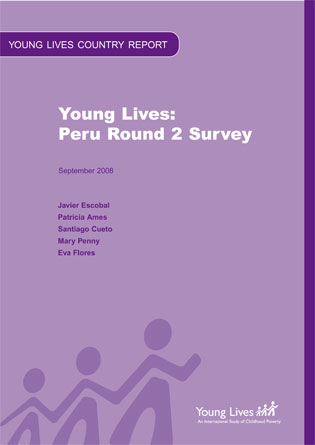Young Lives: Peru Round 2 Survey
| Año | : | 2008 |
|---|---|---|
| Autor/es | : | Javier Escobal, Santiago Cueto, Patricia Ames, Mary Penny |
| Área/s | : | Educación y aprendizajes, Pobreza y equidad |
[2008] ESCOBAL, Javier; AMES, Patricia, CUETO, Santiago; PENNY, Mary; FLORES, Eva. Young Lives: Peru Round 2 Survey. Oxford: Young Lives.
This report presents initial findings from the second round of data collection in Peru between late 2006 and early 2007. It provides a broad outline of key child poverty indicators, as well as changes that have taken place since the first round of research in 2002.
Although the economic and policy context in Peru has become more favourable – following recent economic growth and increased awareness of the importance of early childhood – inequalities between different groups persist. The findings show that rural and ethnic minority children are more likely to experience poorer nutrition and educational outcomes, and have lower levels of access to electricity, safe water and sanitation facilities. The data also show how such inequalities interrelate, for example, poor access to services appears to influence nutritional patterns of stunting and being underweight. Interestingly, urban children report higher levels of subjective wellbeing than their rural counterparts, and ethnic minority children lower levels, perhaps due to perceptions of discrimination.
Evidence of gender inequalities is also found with faltering growth and lower levels of pre-school enrolment among girls, especially in rural areas. Primary school enrolment is more equal but boys are already at an advantage in learning and making the transition to school, following their time at pre-school. Similarly, differences in nutritional status between urban and rural children seem to be defined in the early stages of life.
All these findings underline the importance of investing in early childhood.Future Young Lives research will continue to investigate the inequalities in Peru with particular reference to socio-economic status, the urban-rural divide, gender and ethnicity.
It is hoped that empirical evidence of this kind will play a greater role in shaping childrelated policies in future.






